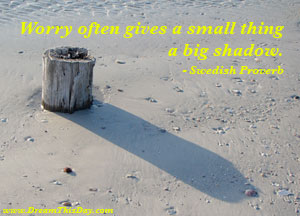Facebook share
Tweet This
Email this

How to Stop Worrying
by Jonathan Lockwood Huie
(Copyright © - Do Not Copy - Please link to my articles instead.)
<a href="http://www.how-to-self.com/worry.php">How to Stop Worrying</a>
 Everyone worries - some people more than others - but worry is a natural human condition. By its nature, worry tends to deal in generalities, and true worry is always about things that have not yet happened. That may not be obvious, so consider an example. Someone says, "I am worried because I lost my job." Actually, that is shorthand for something like, "I have lost my job, and I am worried that I might be evicted from my apartment, not have money to buy food, and be unable to give good care to my family." Worry is about what might happen in the future rather than about what has already occurred.
Everyone worries - some people more than others - but worry is a natural human condition. By its nature, worry tends to deal in generalities, and true worry is always about things that have not yet happened. That may not be obvious, so consider an example. Someone says, "I am worried because I lost my job." Actually, that is shorthand for something like, "I have lost my job, and I am worried that I might be evicted from my apartment, not have money to buy food, and be unable to give good care to my family." Worry is about what might happen in the future rather than about what has already occurred.
Left unchecked, worry can squeeze the juice - all the happiness - out of life. Worry can also harm your health by raising your blood pressure and upsetting your body chemistry. The history of the word "worry" tells its own story. The word "worry" derives from an Old English word meaning "to strangle." Think about how apt that is. Have you ever felt strangled by your worries?
Without doubt, worry is a terrible thing, but is there any way to control worry? One powerful way to combat worry is to put it under a microscope - list each worry, and analyze the worries one at a time.
If you are troubled by worry, make a list of all your worries. Don't stop until you can't think of another worry. It is important that you not hold back any worries, however slight, or generalized, or even silly they may seem.
Categorize your worries. For each worry, ask yourself the following five questions.
 1. Is this worry about a "small thing?" There is a Swedish Proverb, "Worry often gives a small thing a big shadow." Suppose the event you are worried about actually does happen - how bad would the consequences really be? For example if you are worried about forgetting part of your speech or about other people's reaction to a new item of clothing or hairstyle, consider the worst possible outcome. Suppose people actually did laugh at you? Is worrying about that worth jeopardizing your health and happiness?
1. Is this worry about a "small thing?" There is a Swedish Proverb, "Worry often gives a small thing a big shadow." Suppose the event you are worried about actually does happen - how bad would the consequences really be? For example if you are worried about forgetting part of your speech or about other people's reaction to a new item of clothing or hairstyle, consider the worst possible outcome. Suppose people actually did laugh at you? Is worrying about that worth jeopardizing your health and happiness?
2. Is this worry about something that is very unlikely to happen? Such as worrying about getting hit by lightning or bit by a shark. If you find yourself worrying about the possibility of a very unlikely event, some arithmetic and a stern talk with yourself may help. Yes, an asteroid could fall, a shark could bite, a bridge could collapse under you, and lightning could strike, but the odds are very very small. If you worry about that sort of thing, look up the odds and take reassurance from the huge numbers in your favor.
3. Is this worry about something inevitable? For example you might worry about the fact that you are aging and will die some day. It is true that you will die, and it is true that you can't know on which particular day you will die. These kinds of worries are especially challenging. If you have a strong faith in a higher power, prayer is a powerful answer. Whatever your beliefs, fear of the inevitable can be addressed with a stern conversation with yourself about the futility of such worrying. More practically, keep active and focus your energies on challenging projects, interesting people, and being of compassionate service to those less fortunate than yourself.
4. Is this worry about something beyond your control? For example you might worry that something terrible will happen in the world. It is true that horrible things happen every day. Today's TV news will be filled with terrible events. Why invest your energy into guessing what they might be. Also, why waste energy worrying about the consequences of the events in yesterday's news. We live in a very big world with six billion people. Many people die each day. A few die horrible deaths, and you can be sure that the TV news will cover the most graphic tragedies in real-time full-color video. Yesterday's news featured events like murders, demonstrations that turned fatal, oil and gas explosions, and wing-nuts burning flags or books to gain cheap attention. Today and tomorrow will be no different. If you can think of a rational, constructive, and compassionate action to take, please do it now. Otherwise take a deep breath, and turn your attention away from the roar of the crowd. Don't waste energy worrying about such things. Focus only on those things that you are able to, and choose to, affect in a positive way.
5. Is this worry about something you can control - and can improve your life by controlling? For example, suppose that you have received an eviction notice, and you are worried that you will soon find the sheriff at your door to enforce the eviction. This is not an idle worry. In fact, it is quite likely that the sheriff will show up. But is worrying the best thing to do? Of course not. Taking positive action will address the current problem, the more serious probable future problem, and also the worry. Put your efforts into taking action. Worrying won't find you a place to live, but focused action will. If something needs to be done, but you don't know what to do or how to do it, get help. In the eviction example, you might call your creditor or landlord to ask about reduced payments. Or find a state or local agency that offers free counseling on debt issues.
God grant me the serenity to accept the things I cannot change;
courage to change the things I can;
and wisdom to know the difference.
- Reinhold Niebuhr
If you are religious, Niebuhr's Serenity Prayer is probably the best answer to worry ever penned. Whatever your beliefs, consider this affirmation based on Neibuhr's message...
Whenever I feel worried,
I ask whether I can change things.
I act with courage to change what I can.
I accept with serenity what I cannot change.
Whenever you find yourself consumed by worry...
- If there is something to be done, do it now - begin today.
- If there is realistically nothing to be done about an issue, just move on with your life, and make the choice to live joyfully. Get busy with other things. Be of service to others. Be physically active - walk, exercise, take up yoga or qigong. Meditate or pray. Spend time with others who share your interests, and who agree not to complain about their troubles or worries.
Don't let worry squeeze the juice from your life. Take charge of your life by staying busy and focused. Choose to life joyfully in the present, without regret or resentment about the past, or worry about the future.
Thank you for reading How to Stop Worrying.
Read more Self-Help articles
Please sign-up for my Free Quotes and Insights Email on the form below.
Search for a Quote,
Inspiration, or Article
Sign up to receive my Personal Development Articles by email (free)...
Self Esteem - Confidence
Living with Joy, Purpose, and Conscious Choice
Positive Attitude
Motivation
Success - Career
Stress-Free Living
Relationship Advice
Sleep
Money - Personal Finance

Jonathan Lockwood Huie
"The Philosopher of Happiness" - is the author of 100 Secrets for Living a Life You Love, co-author of Simply An Inspired Life, speaker, personal coach, and creator of the popular Daily Inspiration - Daily Quote free email and Regaining Your Happiness in Seven Weeks e-training program.
All materials and writings are copyright © Jonathan Lockwood Huie,
except for quotes and other specifically identified material which belong to their respective copyright holders if applicable.
You may read our about our disclaimer, privacy policy, terms of use, participation in affiliate programs, and copyright policy.
 Everyone worries - some people more than others - but worry is a natural human condition. By its nature, worry tends to deal in generalities, and true worry is always about things that have not yet happened. That may not be obvious, so consider an example. Someone says, "I am worried because I lost my job." Actually, that is shorthand for something like, "I have lost my job, and I am worried that I might be evicted from my apartment, not have money to buy food, and be unable to give good care to my family." Worry is about what might happen in the future rather than about what has already occurred.
Everyone worries - some people more than others - but worry is a natural human condition. By its nature, worry tends to deal in generalities, and true worry is always about things that have not yet happened. That may not be obvious, so consider an example. Someone says, "I am worried because I lost my job." Actually, that is shorthand for something like, "I have lost my job, and I am worried that I might be evicted from my apartment, not have money to buy food, and be unable to give good care to my family." Worry is about what might happen in the future rather than about what has already occurred.
 1. Is this worry about a "small thing?" There is a Swedish Proverb, "Worry often gives a small thing a big shadow." Suppose the event you are worried about actually does happen - how bad would the consequences really be? For example if you are worried about forgetting part of your speech or about other people's reaction to a new item of clothing or hairstyle, consider the worst possible outcome. Suppose people actually did laugh at you? Is worrying about that worth jeopardizing your health and happiness?
1. Is this worry about a "small thing?" There is a Swedish Proverb, "Worry often gives a small thing a big shadow." Suppose the event you are worried about actually does happen - how bad would the consequences really be? For example if you are worried about forgetting part of your speech or about other people's reaction to a new item of clothing or hairstyle, consider the worst possible outcome. Suppose people actually did laugh at you? Is worrying about that worth jeopardizing your health and happiness?